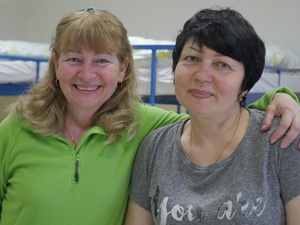Dozens queue every week in Athens to apply for asylum
Dozens queue every week in Athens to apply for asylum

Lines of people sleep rough on Petrou Ralli Street in Athens, hoping to get an interview date and a pink card in the morning.
ATHENS, Greece, March 23 (UNHCR) - Every week more than 100 people, including a few women and children, wait for hours overnight outside a police building in Athens, hoping to apply for asylum.
The moment they have been waiting for comes at 6:00 a.m. on Saturday, when staff at the Aliens Police Directorate in the Greek capital's Petrou Ralli Street allow just 20 people into the building, where they can register their asylum application. Sometimes there are fights to get to the front, but the whole process is over in minutes.
The chosen 20 are given an interview date and issued with a pink card that identifies them as asylum-seekers with the right to remain in the country, seek employment and receive minimal assistance while their application is processed and considered.
The unlucky ones are dispersed, though many return the following week. Some have been trying for months, despite the risks of being deported if they are caught without a pink card. Earlier this month, Greece's Minister of Citizen Protection Michalis Chrissohoides warned that some 1,000 undocumented foreigners would be moved from Athens to a facility run by the police in Kozani, northern Greece.
The ritual on Petrou Ralli Street has been taking place every week for several years, but UNHCR and other humanitarian groups have been raising their concerns about the treatment of the asylum-seekers, believing they should all have unhindered access to the asylum procedure.
They also worry about the conditions that the asylum-seekers must endure, including having to wait in line for many hours without access to toilets and other basic facilities. Many sleep surrounded by piles of litter.
When UNHCR visited Petrou Ralli Street one recent Saturday morning, people from several sub-Saharan countries, including Burundi, Cameroon, Ethiopia, Ghana, Rwanda and Senegal as well as nationals of Iraq and Syria, were waiting in line, hoping that this would be their week.
In Rome, Laurens Jolles, UNHCR's regional representative, expressed concern at the situation. He urged the Greek authorities to address "this long-standing issue and ensure that access to the asylum procedure is guaranteed."
UNHCR is helping Greece to reform its asylum system. Unhindered access to the asylum procedure through proper registration of claims and efficient processing constitute is an integral part of the needed improvements.
A newly established Asylum Service envisages such improvements once it becomes fully operational. But there is an urgent need for immediate measures to improve conditions for those waiting each week outside the Aliens Police Directorate.
Nge from Cameroon told UNHCR she had tried five weeks in a row to get an interview at the aliens directorate since arriving in Greece in December. This time, after the police had selected the 20 to be allowed in, she desperately called out "I beg you." It made no difference and she left in tears.
Another lady, Sara from Ethiopia, has been living in Greece for 18 months. She asked for UNHCR's help, while complaining that she could neither return to her country nor go to another country in Europe. Three teenagers from Syria, who said they were in Greece without family members, each managed to get a precious pink card after failing the week before.
By Ketty Kehayioylou in Athens, Greece









